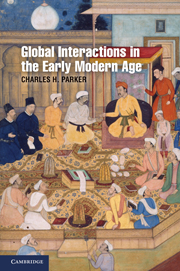Book contents
- Frontmatter
- Contents
- Maps
- Acknowledgments
- Global Interactions in the Early Modern Age, 1400–1800
- Introduction: The Global Integration of Space
- 1 European States and Overseas Empires
- 2 Asian States and Territorial Empires
- 3 International Markets and Global Exchange Networks
- 4 The Movement of Peoples and Diffusion of Cultures
- 5 The Formation of New Demographic and Ecological Structures
- 6 The Transmission of Religion and Culture
- Conclusion: Converging Destinies
- Notes
- Index
- References
5 - The Formation of New Demographic and Ecological Structures
Published online by Cambridge University Press: 05 June 2012
- Frontmatter
- Contents
- Maps
- Acknowledgments
- Global Interactions in the Early Modern Age, 1400–1800
- Introduction: The Global Integration of Space
- 1 European States and Overseas Empires
- 2 Asian States and Territorial Empires
- 3 International Markets and Global Exchange Networks
- 4 The Movement of Peoples and Diffusion of Cultures
- 5 The Formation of New Demographic and Ecological Structures
- 6 The Transmission of Religion and Culture
- Conclusion: Converging Destinies
- Notes
- Index
- References
Summary
The ways in which human societies have provided for themselves, whether it was the hunting and gathering strategies of native tribes in North America or the extensive cereal agriculture of peasants in China or the seasonal whaling expeditions of coastal communities in Siberia, have exacted a toll on their physical landscapes. Settled agriculture, the caloric basis of all civilizations around the world, makes exacting demands on natural ecosystems and imposes drastic changes on virgin terrains. Despite the destructive environmental effects that sometimes accompanied large-scale crop cultivation, agriculture has without a doubt enabled human societies to grow at a prodigious rate, allowing for much more concentrated population densities than were otherwise possible.
The practice of extensive agriculture throughout history, however, has not freed human populations from their fragile relationship with natural habitats. At the end of the eighteenth century, Thomas Malthus, an English clergyman and economist, identified clearly the limits of agriculture in his influential treatise, “An Essay on the Principle of Population.” Malthus argued that societies based on agriculture will always tend to outgrow their food supply. According to the Malthusian calculus, “population[s], when unchecked, increased in a geometrical ratio, and subsistence for man in an arithmetical ratio.” That is, humans reproduce at a much greater rate than their capacity to produce food and thus at regular intervals stand at the brink of their own destruction.
- Type
- Chapter
- Information
- Global Interactions in the Early Modern Age, 1400–1800 , pp. 146 - 181Publisher: Cambridge University PressPrint publication year: 2010



